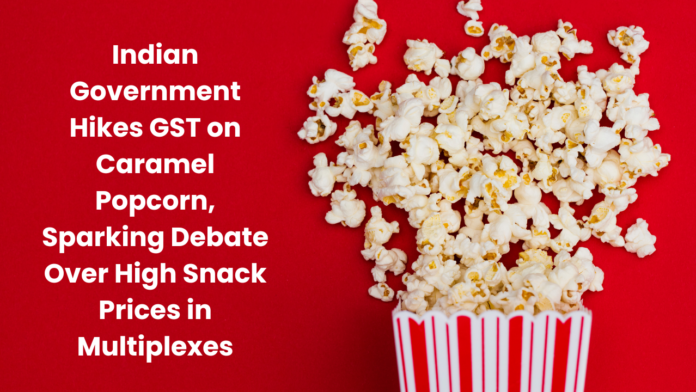In a move that has generated significant debate, the Indian government has increased the Goods and Services Tax (GST) on caramel popcorn from 5% to 18%. The hike has drawn attention to the rising cost of snacks in multiplexes, further fueling concerns about the affordability of movie outings. This policy shift, coupled with the growing availability of films on streaming platforms, has led to a decline in footfall at cinemas.
Popcorn, often seen as the quintessential movie snack, has been at the center of discussions. Multiplexes have long faced criticism for charging exorbitant prices for snacks, and the increase in GST has only added to the financial burden for moviegoers. A bag of caramel popcorn, which was once priced affordably, now carries a hefty price tag, deterring many from indulging in snacks while watching a film.
The price hike comes at a time when the movie industry is already grappling with a downturn in audience numbers. With the ease and affordability of streaming services, many movie lovers now prefer the comfort of home viewing, where they can access the latest films at a fraction of the cost of a movie ticket. The accessibility and convenience of platforms like Netflix, Disney+ Hotstar, and Amazon Prime Video have contributed to a significant shift in viewing habits, leaving multiplexes scrambling to attract more visitors.
In response to the downturn in cinema attendance, some multiplex chains have taken proactive steps to entice customers. A few have introduced initiatives like capping the price of snacks at Rs 99 in a bid to offer a more affordable experience for moviegoers. The move has been welcomed by some, but many argue that it is only a temporary solution to a larger issue – the rising cost of cinema outings overall.
Industry experts suggest that while price capping on snacks may help in the short term, multiplexes must re-evaluate their business models to ensure long-term sustainability. “The cinema experience is not just about watching a movie; it’s about the entire outing. The cost of tickets, snacks, parking, and other amenities often makes it an expensive affair. To truly compete with streaming platforms, cinemas need to offer better value and an enhanced experience,” said an industry analyst.
The GST hike has also prompted discussions on the broader impact of the government’s tax policies on entertainment and leisure industries. Critics argue that the increase in GST on snacks, particularly those sold in multiplexes, is a regressive step that places an additional burden on consumers. “It’s already difficult for families to afford a day at the movies. Now, with the increased tax, it’s even harder,” said one moviegoer at a multiplex in Delhi.
As multiplexes strive to balance profitability with customer satisfaction, the ongoing debate about snack pricing and the impact of streaming services on the cinema industry shows no signs of abating. With the holiday season in full swing and many eagerly awaiting blockbuster releases, the future of multiplex cinema in India may depend on how well it can adapt to these changing dynamics.
For now, moviegoers will have to navigate the complexities of rising prices and evolving entertainment choices, hoping that the charm of the big screen can still hold its own in an increasingly digital world.




